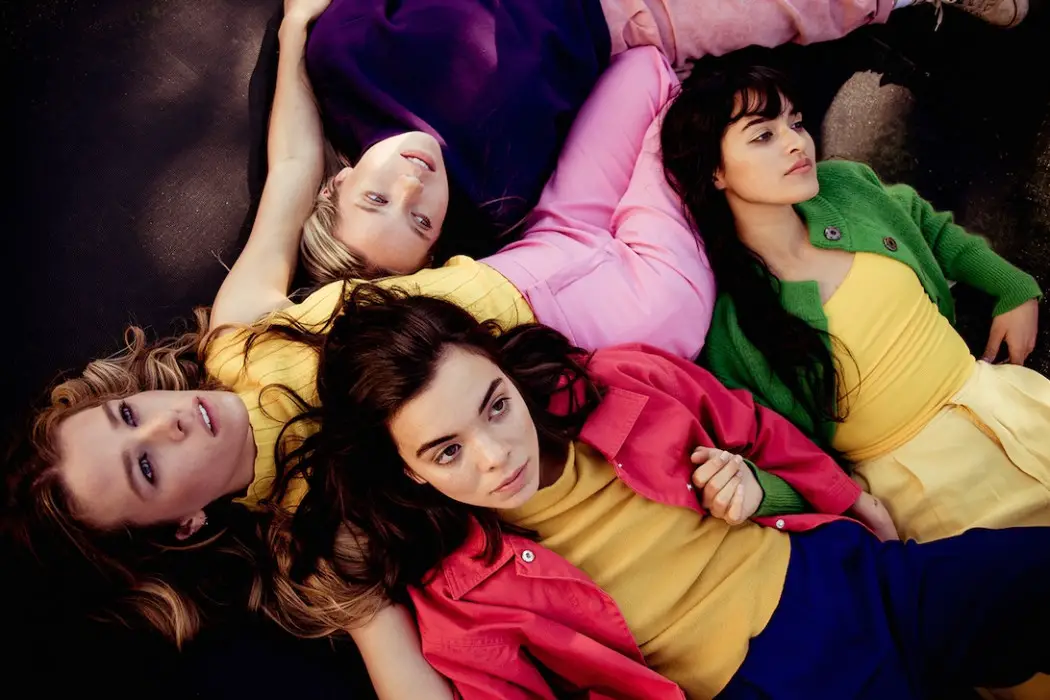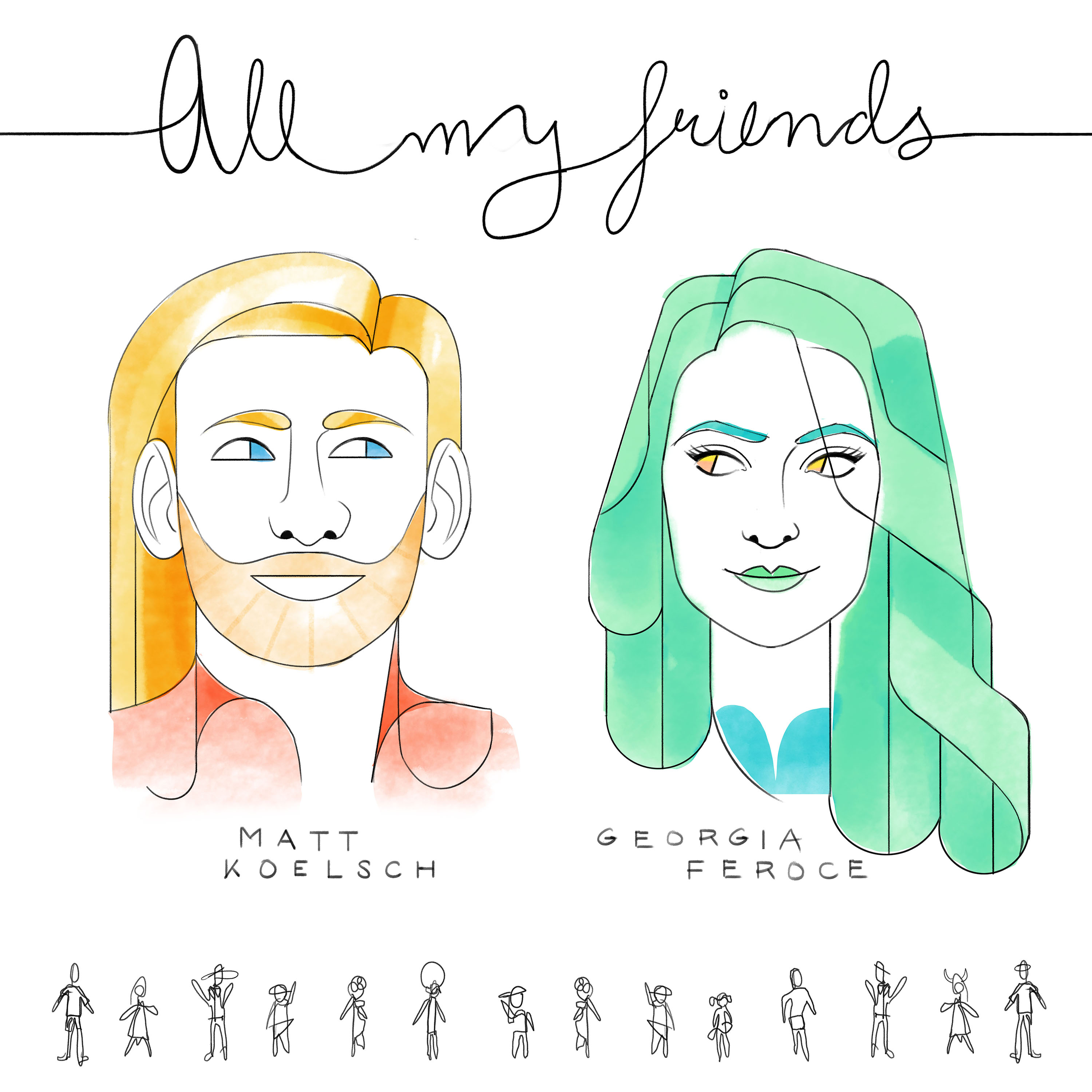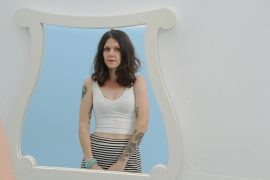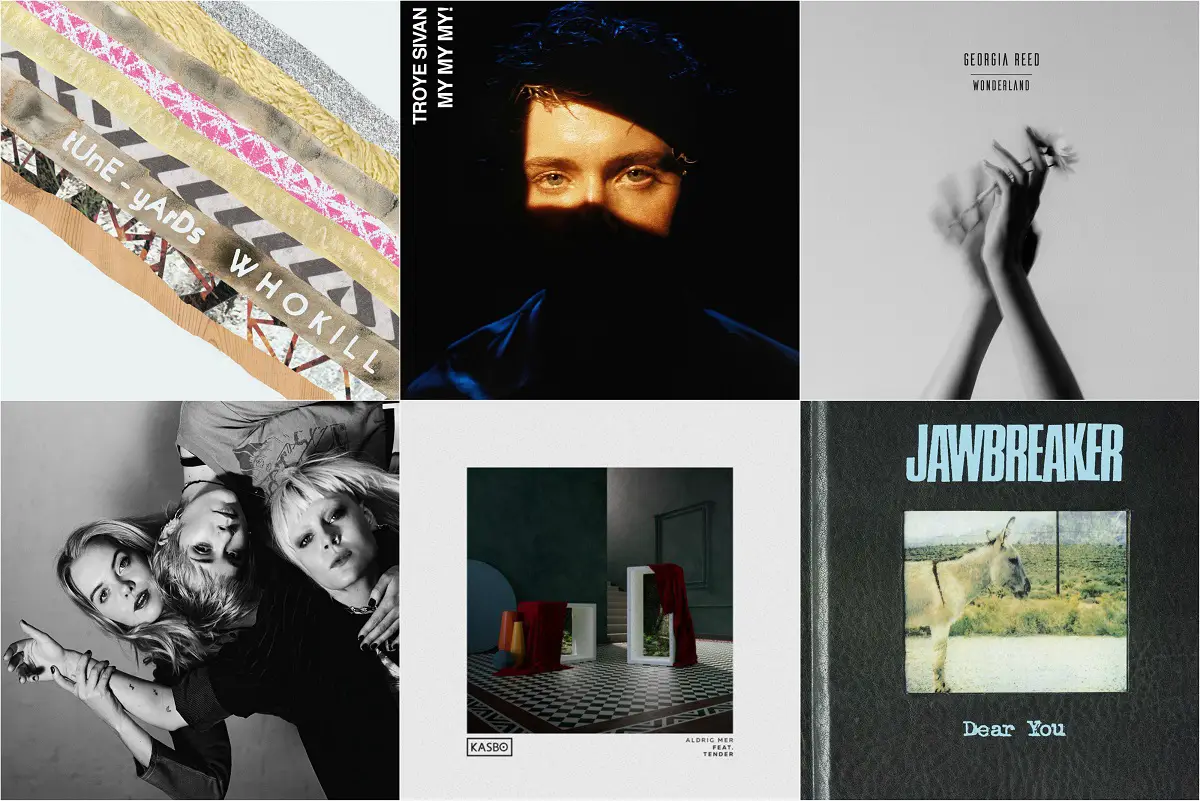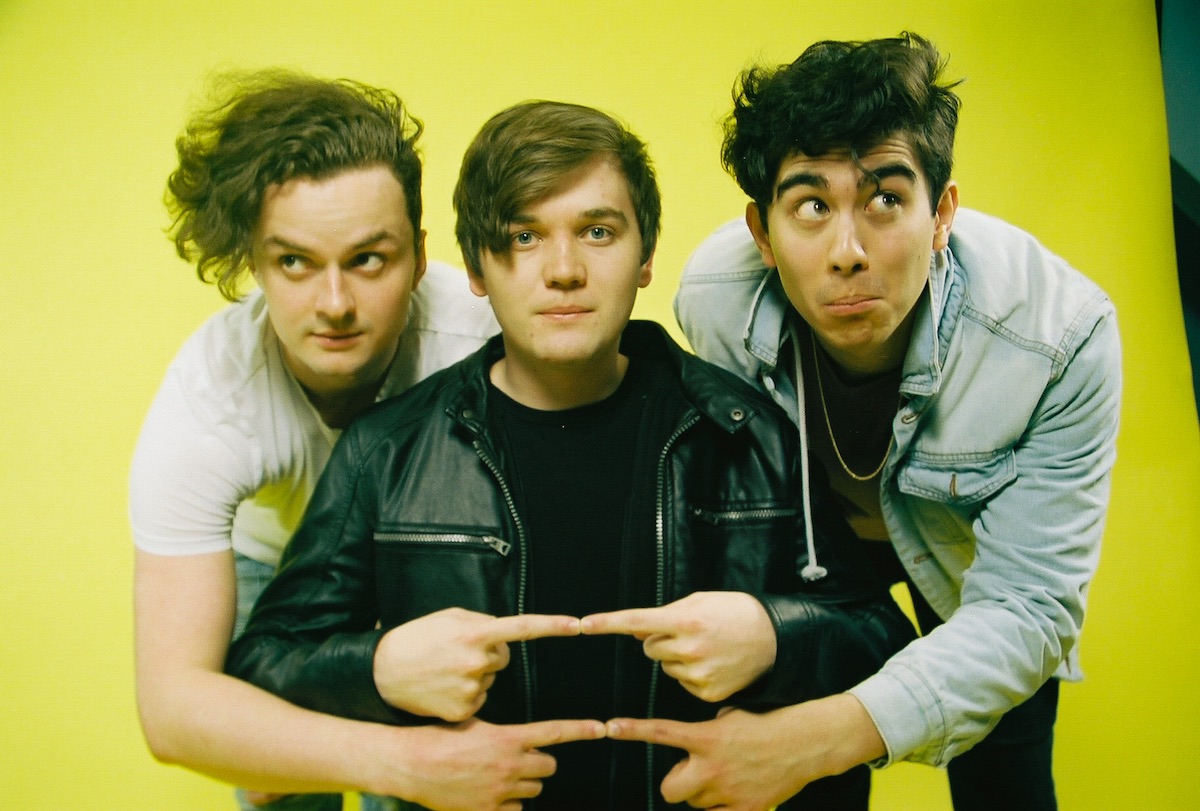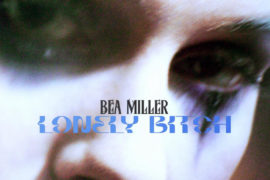Effervescent alt-pop band The Aces are a spark in the dark: In our interview, they discuss their musical identity, the importance of self-worth and elevating others, breaking down gender barriers, and much more.
‘When My Heart Felt Volcanic’ – The Aces
The Aces are truly one-of-a-kind: Positive and confident, the Provo, Utah export have been inspiring audiences with their uplifting alt-pop music since they first emerged in 2016. Consisting of lead vocalist and guitarist Cristal Ramirez, her sister and drummer Alisa Ramirez, guitarist Katie Henderson, and bassist McKenna Petty, The Aces blend pop and rock influences into a funky, fiercely honest and colorfully melodic blaze of emotional revelry: Their songs – some euphoric and celebratory, some driven and explosive, some mellow and reflective – are always intimate and profoundly spirited.
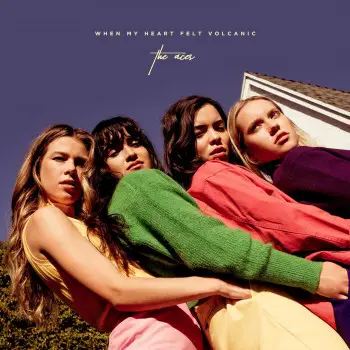
The sort of energetic young band that attracts an equally effervescent, super-charged fan base, The Aces rose to what felt like the top of the indie world with 2018’s debut album When My Heart Felt Volcanic, a 48-minute display of blistering passion and talent.
“All in all, The Aces knock the door down with their grand entrance to the music industry,” Atwood Magazine’s Baylee Less wrote at the time. “This compilation of songs urges you to jump feet first into a pool and out of sour relationships. Girly, tangy, and wild, we can tell The Aces plan to monopolize the world of indie rock after barely even passing go.” Described as “colorful and crisp” and lauded for its “summery musical bliss,” When My Heart Felt Volcanic showcases tremendous lyrical prowess alongside an emotional depth that cuts through each song, making every moment of the record a special, if not important one.
Featuring such hits as “Waiting for You,” “Volcanic Love,” and the group’s debut single “Stuck,” the album arrived thick in the haze of peak Aces fever season: The band had recently finished a tour with COIN, and were at the time traveling cross-country with X Ambassadors. They would go on to play a slew of high-visibility festivals and support 5 Seconds of Summer’s North American tour that fall, followed by their own headline European tour and a headline US tour in 2019.
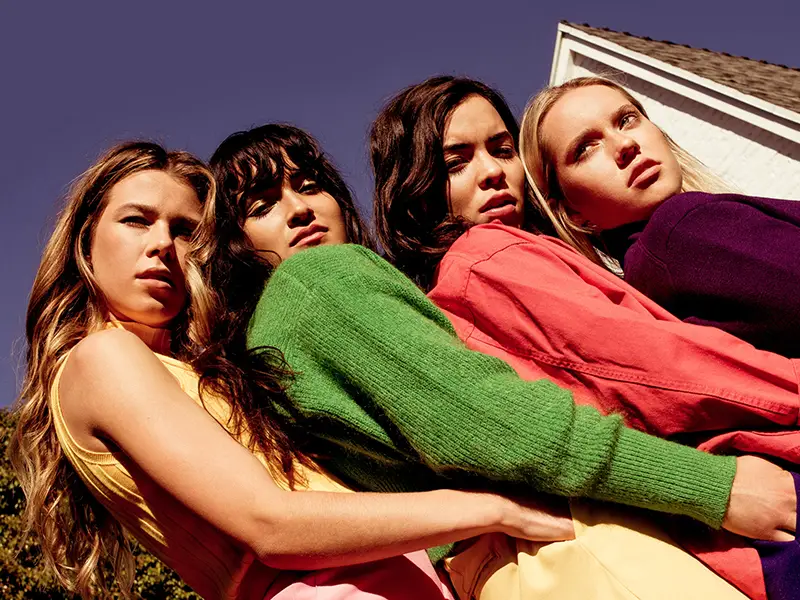
If we’re being honest, it’s still Aces season: The band have ambitiously toured nonstop for the past two years, staying in and around the spotlight while connecting with fans on the ground and in person. ”I feel like our fans are really sweet and fun,” Cristal Ramirez says. “We always have fans making friends at shows and creating such a positive and welcoming, empowering environment, and I love that. I just love seeing more positivity spread as the music gets bigger.”
Meanwhile, When My Heart Felt Volcanic retains all the fresh pop, spark, and shine that made it so noteworthy in the first place.
Timelessly meaningful and effortlessly cool, The Aces’ debut is one for the ages. As for the band members themselves, “we just stay doing what we love to do and try to encourage and uplift people – especially young girls – to do whatever they want to do.”
Atwood Magazine spoke to The Aces about their creative process and musical identity, the importance of self-worth and elevating others, breaking down gender barriers, and so much more. Get to know this important band in our exclusive interview!
A CONVERSATION WITH THE ACES
Atwood Magazine: Everyone who talks to me about The Aces mentions how engaging and invigorating your music is, and I can only imagine how that translates to the live experience. How have you been going about touring, and how has it affected The Aces’ identity over the past year?
Cristal Ramirez: I think that the more you do anything right, the better you get at it. Touring is tough; it’s a very interesting lifestyle, and if you’re an opening band you it’s completely different than playing headline shows. I think it’s just learning and getting that experience to know what you then want… To me, tour feels like crazy performance practice.
Alisa Ramirez: I feel like when you’re on tour, you learn so much about yourself and your band, the music… You get to learn and get to know your fans really well, and kind of like who they are. It’s really been amazing to see, all over the country and in different countries consistently, we’re drawing so many different types of people. You start to understand like, “oh okay, cool.” Our music attracts cool young, fresh, fun people. It makes us more excited to create more and develop even further, because we’re learning so much about what our entire “Aces universe” is, and the people that exist in that fandom.
I love that description: Cool, young, fresh, and fun. Your music is all of those things. It's upbeat and it's kind of got a party atmosphere, but at the same time one of the things I love most about your music is meaning. I think that your music is really sincere, when it comes to the meaning behind the songs.
The Aces: Thank you so much! That is a very cool compliment.
I want to talk about your debut as a whole. When you were going into your sessions for this record, were there any particular things that you were consciously saying, “We want to put on our album one, we want to talk about or we want to zero in on here”?
Cristal Ramirez: I think what it was when we went into session was not necessarily saying, “This is exactly what we want on our record, this what we see.” Because we always keep our creative process very open to change, and whatever feels right and whatever feels good, because that’s how you create your best part, is when you just let it take its course — but you just show up to do the work.
I think for us, what was really important and what we would talk about in the studio all the time was two things. One, are you being as honest as you can be? As honest as you can be with your music… just authentically yourself. Are you saying what you would actually say? Whether that’s about a relationship or friendship or whatever. So we really check ourselves lyrically as well as melodically to be like, “Is this saying what we need it to say?”
And then on top of that, another really important thing that every time we go into the studio is, Alisa and I, we do most of the melody and lyric songwriting together, but we always look at each other and say, “Can Kenna and Katie get behind this?” We’re all so different as individuals, you know what I mean? Like our views, everything, we all have like our own personalities and for us it’s kind of like, “okay, but does this represent all four girls?” And if it does, then we feel like it could be universal, because we are so different and we just really try to make our music something for everybody. Just to connect to those deep human emotions that we all go through and how to get that out on paper. So you get fans to say to you, “Oh my God, like you just painted the picture of my life.” You know?
I think I understand. When you do bring a song to the table, what tend to be the first things you talk about?
Alisa: Yeah, whenever we finish lyrics and melodies, we’ll shoot it to Kenna and Katie. I love hearing their reactions and their thoughts on things. Not to speak for Katie, but I know Katie always jumps straight to instruments. She’ll want to talk about, “Oh I love that guitar, I wanna add to that. Blah, Blah, Blah, blah, blah.”
Cristal: She’s very much the producer.
Alisa: Yeah she’s such a music head, it’s interesting. Kenna’s here. What do you think? What do you think when we show you songs?
McKenna Petty: I just love the feeling that I get the first time I listen to it; I don’t really listen as much… I mean, obviously I do listen to the instrumentation, but just the initial feeling of the vibe and the lyrics and everything – the melodies… I get so excited hearing a new song, and it just makes me feel a certain way. That’s mostly what I go off of, because then we all go in together and flesh it out more. It’s really cool to hear the bones of a song. For example, I remember first listening to “Put It On The Line,” one of the songs off of our new record, and just feeling so stoked about it. It was so cool, it was so fresh and new and experimental, even just at that demo stage, but it’s just a really exciting thing. I get super excited to be able to go in and work on it all together.
I love that you brought up “Put It On The Line,” because that's actually one of the more unique songs on your record. There's a heaviness that really isn't heard in some of the songs before it.
Cristal: We wrote this record over three years, really. It was a lot of different sounds and obviously I think we sound like our cohesive sound that you hear throughout the entire record, but “Put It On The Line” felt really important because it’s a darker, different side of our band. I think we’re just kind of relishing that… we’re just kind of sitting in that pain, and I think that that’s an important thing.
Alisa: It just really kind of came out that day in the studio. It actually came out of a dud day in the studio. We spent six hours building a track and working on a song with our friends Sam and Simon. No one liked it. It genuinely was a rainy day in Brooklyn. The energy wasn’t hopping in the room. And so it came out just like, that’s what we were feeling. We were feeling angry, we were feeling dark, and “Put It On The Line” came out that frustration, and what a couple of us were going through in our personal lives as well. I remember, we were trying to write a happy song that day, and you can’t play pretend in the studio because people will smell the rat. You’ve got to just make what you’re actually feeling. You’ve got to really stay true to what you’re actually feeling.
You can’t play pretend in the studio because people will smell the rat.
I think that's really true. What I love about that song, and certain parts of the second half of the record, “Hurricane” and “Waiting For You” as well is that they make it so that The Aces cannot ever be defined as a one-trick pony. There is no singular emotion about this that goes all the way through. There's more to you than an anthem.
Cristal: Totally. Those are all different moods and stuff and sides of our personalities. We all listen to tons of different genres of music, and the one thing that was super important to us on this album, and with it being our debut as well, was that we just wanted to make sure that you didn’t listen to one song and you had heard the whole record. You know what I mean?
Of course.
Cristal: There’s a time and a place, like certain albums are certain moods and they carry that mood through the whole thing. I think that there’s something to be said about that, but I do think that as artists, we’re constantly wanting to break out of the box and try something new and experiment.
Alisa: Especially as our debut, we just wanted people to get to know us through this. This is the first full body of work we’ve ever put out. If someone’s going to digest this album, they should walk away being like, “Oh, okay I feel like I kind of know this band now.” There’s things that are cohesive that are undeniably Aces, but then also… There’s so many things that stem from that. There’s different moods on the album. There’s different angles, and you can get to know our dark side or happy side, funky side, whatever. It’s all there, but it’s all Aces.
You can get to know our dark side or happy side, funky side, whatever. It’s all there, but it’s all Aces.
Cristal: I think it’s interesting that you bring up those three songs too, because I remember specifically with those three… When we were listening to them and kind of deciding what songs are going to be on the album, thinking, “Well, this song’s really important to the album.” Like, we need this. With “Hurricane,” and “Waiting for You,” and “Put It On The Line,” I remember feeling that it’s really important that we show this side of us.
I mean, you don't end the album on a traditionally happy note.
Alisa: Well, “Waiting For You” is like a love song though.
Kind of.
Cristal: Kind of, yes. I think it’s more of a desperation, kind of… I don’t know; I think it’s an open-ended ending. You know what I mean? I don’t necessarily think it has to be sad and I don’t necessarily think of it’s going to be happy. It’s just, it is what it is, and you are expressing yourself.
It's not the same feel-good. And it leaves me saying, “Wow, oh my god, I can't wait for album two.”
The Aces: Thank you! That’s awesome, thank you.
While I understand there is no one side to your band, are there any specific songs that if people had to listen to The Aces to understand you, that you would want them to listen to the most?
Cristal: For sure. I think one is probably the title track, “Volcanic Love,” ’cause that just feels so… I know to me and I think I can speak for the girls here, that just feels like with quintessential Aces. That’s the root, those shiny guitars and driving beat and those big melodies. We found our sound with that song. That song was such an important moment for us as a band.
Alisa: I think for everything from the rhythms, the drum sounds and the rhythms, to the guitar tones to the melodies, it’s just that whole thing – that’s a big Aces mood, and that song specifically showcases a lot of the artists that we were inspired by. So I’d say “Volcanic Love” and I don’t know, what do you think another one is? Honestly, “Lovin’ Is Bible” is a good one, “Strong Enough” was the first one that came to my head just because, same thing – the rhythm, the ’80s super empowering, funky bass and guitars. All of that, everything that went into that song there is this cool confidence that is pretty naturally us Aces.
Cristal: I also do feel like at the same time, we are artists and we want a career in this, and you’re definitely not going to be the same person at 19 and 20, and 22, that you’re going to at 30. So it’s like, who knows what’s going to happen!? Who knows what kind of records we’re going to make? I think this is always going to be our roots and it’s been an amazing discovery and it feels really right, right now. Who knows? I guess we’ll see what the next records sound like, we’ll just kind of see what happens. We’ll probably still be doing funky shit. You never know.
No, I hear you. But you never stop, and you constantly change and you show that.
The Aces: Thank you.
You mentioned “Strong Enough” and this is a good segue: One of my writers really loved this strain of female control and confidence in relationships, and going away from traditional dating ideals.
Cristal: Yeah, absolutely. There’s a lot of performers like Beyonce and Lady Gaga who take on personalities in their music who aren’t … who are who they are, but a very exaggerated version of themselves and who they want to be. You know what I mean? So, I think, with “Strong Enough,” all of us have that mentality of like, “I’m in my shit, I’m working hard, I’m a driven person and are you strong enough to be in my realm?” Can you keep up-kind of thing. It’s like the Spice Girls thing of, if you wanna be my lover. You know what I mean?
Alisa: My favorite thing about that song is the persona that I think Cristal takes on in that song. She almost sounds different in that song, and it’s really super powerful. I love it.
Cristal: When I listen to that song, I get empowered every time I listen to it ’cause I’m like, “damn.” That’s the way everybody’s got to live their lives, obviously to be kind and loving and open to love, but at the same time, hold yourself at a high standard and know that you deserve to be with someone who can really make your life better and keep up with you. You know?
Know that you deserve to be with someone who can really make your life better and keep up with you.
There is a theme throughout the album about relationships: What do you do today, where everyone is striving, hopefully, toward an empowered place. In today's dating culture it's hard to ever feel comfortable or to know what rules to follow. So why was it important for you to include this theme of female-forward culture and control on the album?
Alisa: I think we just always found it really important to know your worth. Young girls always struggle with confidence and stuff, especially like dating. I feel like a lot of people sell themselves short, but it’s really just like a mental thing. You got to know your worth: You got to know that you’re valuable, and you got shit going for you and that no one should ever have the upper hand over you. I think that’s just how we were raised, to know that. I think we owe some of that to our parents.
Cristal: Really at the end of the day what it comes down to, and something we really try to live by, is whether you’re a young girl, which typically I do think that the females struggle with that sense of confidence – but at the same time whether you’re a guy, whoever you are, whatever relationship you’re in, you’ve just got to know you can’t let that kid drag you down. You can’t let someone have a power over you and hurt you. Or just not be able to benefit your life and you have to know to walk away from that and be strong enough to be like, “I don’t need anybody. I’m good with me and I’ll meet the right person when I’m supposed to meet them.”
McKenna: I think it’s an interesting thing because we’re all very sympathetic, loving, caring girls, and we have very strong women in our lives, but we’ve also had women in our lives struggle with that and we’ve seen examples of that. So I think we learned a lot through that. We were just talking about it too; it’s so important to just think of relationships, almost be kind of selfish sometimes. You have some struggles giving our full hearts to people and just loving so deeply which is so important and such an amazing quality to have. But it’s really important to think, how is this person benefiting my life, how are they making me happy, instead of just giving, giving, giving. And that seems like a really cool lesson that I think we all learned in the past couple days.
That's very empowering. So, you’ve been labeled a female rock group by press releases, media outlets, and so on. I see the way bands are shaped, and as a guy, I think, “This is important.” But at the same time I think, “When do we get to be at the place where the female aspect doesn't have to be a part of the identity? Or it doesn't have to be part of the press release?”
Alisa: Yeah, for sure. That’s an interesting thing to bring up because somebody tagged us on Instagram. Our Wikipedia used to say, “The Aces (all-girl band)” in parenthesis, and it just recently got changed; now it just says in parentheses, (American band). It was really cool to see that. I think it’s just a slow, big cultural movement, and it’s going to take time.
Cristal: Yeah. It’s like a double edged sword, right? Because there’s part of us that feels like, “Come on, quit pigeon holing us… ” You know what I mean? But then there’s another part of us that’s like, “Why are we even looking at that as a pigeon hole?” It’s a beautiful thing to be women. It isn’t the norm to see all female musicians playing in a band.
McKenna: I get why people talk about it now because there’s not that many of them.
Cristal: We take pride in it a lot of the time. For me, it doesn’t bother me because I’m not ashamed to be a woman. I’m so fucking stoked that I’m a woman. I’m so stoked that I get to play shows and have these young girls come up to me, and we’re changing their perspective. We’re changing the way they look at life and the way they look at what they’re capable of. I could not be more proud that that is our job, you know what I mean?
That's amazing.
Cristal: It’s really kind of… it’s a touchy thing. I totally get where you’re coming from and I totally agree with you ’cause I’m like, at what point are we just going to let women in positions of power be the norm.
Alisa: I think it’s the type of thing too, it’s kind of how you take it as well. ‘Cause I feel like people, they’ll say the female band thing and I get where it’s annoying. I get what you’re saying, I get where it’s annoying but I also get where it’s, people say it a lot of the times to bring attention to it, which I think is kind of good because we should be bringing attention to women doing things they don’t normally do, so that other young women can see that. Other women can be like, “oh whoa, this is happening. I could do this.”
Cristal: You can always tell when someone’s saying it in a bad way. You know what I mean? You can always tell, and so I think a lot of times people are more trying to be like, they’re all females How amazing is this?! But you can always tell when someone’s like, “oh… the all ‘female’ band.” And it’s like, “well that’s your problem.” Like when they’re trying to make it a genre or something. And at the same time, because it isn’t the norm, we try not to totally blame people for not taking it as the norm. They’re not used to it. So we’re just working on every day, getting on those stages so that we break that down.
What has your experience of that been touring across the country? How has touring grown your perspective?
Cristal: It’s interesting. I think different areas definitely get different reactions, but it also depends on who you’re touring with. If it’s a headline show, it’s totally love. No matter where we are, it’s all of our fans showing up and going crazy. When we opened for Coin it was amazing because same thing, we were a really good pair as far as demographics. But then opening for another band that’s much more alternative, it was different – and it was surprising to see in the more obviously progressive places such as New York, L.A., places like that, people loved it ’cause they think you’re all very… they drew a lot of like older men in New York and L.A., they fucked with it, they were like, “ah this is dope, these girls are rad, blah, blah, blah.” But in more southern states and some of the midwestern states, you could see and you could feel the energy in the room was like, “Oh, who the fuck are they?”
Alisa: It’s opened our minds to be like, “Oh, okay… Prejudice is still very alive.” You know what I mean? In certain parts of the country, when you get on the stage and in the Midwest, opening for a very alternative, all male band. It’s kind of this air of, “Who are these girls? Can they even play? Prove yourself.”
Cristal: Yeah, 100%. We even have some comments one time, it wasn’t crazy or anything, but on that tour, I remember we had someone yell, “Oh good thing you’re hot!” and stupid shit like that.
Alisa: It’s just a different environment.
Cristal: It’s just misogynist bullshit basically. But we’re really lucky ’cause that hasn’t been the majority of our experience. It’s amazing though to tour and realize, “oh shit. Okay.” We’re doing important … just by getting on these stages and switching up what these people are used to seeing. We’re doing important work, you know what I mean? I think that it’s more just opened our eyes to be like, “Okay, there is work to be done. There are still people who have these views, and e’re just going to keep doing what we love to do.
Alisa: That’s one of the best parts of it, huh? Even those weird… that misogynist vibe, when it changed and when we saw their faces light up and we saw that we won them over, and then they stood in line to meet us afterwards and get a picture. It sucks to hear, “Oh when you guys first got on stage I was like, ‘Oh, who are these girls?’ But then by the time you started playing, I was like ‘Holy shit, these girls are dope.’” That was nice too.
Cristal: Yeah, so it’s dope to change minds. At the same time, I don’t think it’s anything we pay too much mind to; we just stay doing what we love to do and try to encourage and uplift people to, you know – especially young girls, to do whatever they want to do.
We just stay doing what we love to do and try to encourage and uplift people to, you know – especially young girls, to do whatever they want to do.
Cristal: Yeah, a hundred percent. I think it’s just full circle; it’s all the way around. I think as young kids we didn’t even necessarily know that’s what we were doing, we were just making music ’cause we just love to make music. And that’s really the driving factor of all of this. But it’s just like all these bonus points that we get to inspire young females.
Alisa: Actually I think it’s such a huge thing you learn through touring too, kind of how we started the conversation about touring: We didn’t realize fully, that whole movement, and kind of everyone’s… like, there’s so many different opinions on it, until we toured. I mean we’re from Utah, it’s different too.
Cristal: And just like you said, you live in New York, you’re with like-minded people. It’s easy to get caught up in your thing and you just keep dope people around you, and you all have very similar views and you’re progressive. But then you get to travel around the world and you’re like, “Oh shit, there’s work to be done.” And we couldn’t be more proud to be a part of that.
Well said! You're totally right; that's really incredible to hear from your perspective, thank you. It's amazing to learn how you've taken that experience and turned it on its head.
The Aces: Thank you so much.
To go to a brighter note, earlier we discovered and I clung to the words, “cool young, fresh, and fun.” As Aces are moving forward, are there any other descriptors you hope to add to that list in the future?
Cristal: I like positive. Positive, and just fucking confident. I feel like that’s my favorite thing too; I feel like the type of music you make attracts a type of person. I’ve been to certain artists’ shows where the crowd’s real negative and real catty. You’re like, “Oh shit, these are your fans.” And it makes sense because your music is so dark. I feel like our fans are really sweet and fun, and a lot of our fans, they’ll come up in groups and go, “Yeah, we all just met waiting in line. We’re all best friends now. We just got each other’s numbers.” We always have fans making friends at shows and creating such a positive and welcoming, empowering environment. And I think I love that. I just love seeing more positivity spread as the music gets bigger.
We always have fans making friends at shows and creating such a positive and welcoming, empowering environment.
Your album is the kind of album that makes me want to be a better person as I listen to it.
The Aces: Ooh! That may be the nicest thing anyone’s ever said to us.
You walk down the street it's like, “Oh yeah, I should smile.”
Cristal: Thank you so much. I think music is ultimately, it’s a healing thing, you know what I mean? And it can be a positive healing thing. I think as young kids that’s why we were so attracted to it, because we just … when you’re listening to an awesome song and you have that beat in your ears, that’s just such a moment of euphoria. It just feels amazing and we just want everyone to feel that, you know? Through our music, to put out that positivity in the world, I think is just so important.
I completely relate to that. You talked earlier about your influences and I'm curious about the music you as individuals listen to as well. Do you feel like that has a similar strain to it, in terms of positive vibes?
Cristal: I mean we all listen to tons of different genres. Obviously there’s a time and a place to turn on like a real dark record and groove into it. I think we all definitely, like our music tastes for sure… We’re all positive people. We don’t want to be listening to super negative shit constantly. It’s really funny actually because this makes me think of podcasts and stuff. We’re all really sensitive people – like our energy – and we try to keep it positive and to keep a positive mindset. I get really fascinated by true crime and I was listening to this murder podcast and I just had to stop and I was like, “I can’t listen to this. it’s too much.” Maybe one episode every couple of weeks if I feel like I’m in a real positive spot. But I think that that’s something that we all have in common. We’re so affected by dark energies and stuff that we just want to keep it light and keep it inspiring. But at the same time we do have those moments where everyone’s got to go dark.
Alisa: Our music, as you were talking about, it’s all pretty different. So I feel like the darker songs had been inspired by some of our favorite darker artists, like “Put It On The Line” was really inspired by Banks. She is quite a dark artist and I love the hell out of her. A lot of our music’s been inspired by The 1975 and they can sing about some pretty dark stuff, but a lot of their music just really makes you want to dance. It’s very like, from the syncopated rhythms, to the guitar tones, they’re just so nostalgic-sounding and exciting. I think we drew a lot from that as well. As far positivity, I feel like a lot of ’80s pop is really fun and positive, and stuff like Michael Jackson, Whitney Houston: It’s so euphoric and it’s some of the best pop music ever made. We’re very inspired by ’80s pop, so I think that translates into some of the higher notes on that.
Cristal: Yeah, there’s a side of it too that’s if you really listen to our lyrics sometimes, it’s painful, it’s sad. You can tell we were going through something, but we bring the music around it to almost make it a therapeutic thing. So it’s … Okay, “Stuck” is about being in a relationship that you know is not going anywhere but you don’t know how to get out of, and you feel like you’re stuck. It’s like there’s this desperation and there’s this sadness, but yet you’re dancing to it and singing your heart out and getting yourself through it. You know? So I think that that’s kind of been something we’ve always been interested by in pop music, is the ability to write about something really intense and sad and heartbreaking, but use the music to kind of act like medicine around it.
That's incredible. It's so obvious to see how passionate you are about your songs and about your art. It's really telling when you meet an artist, or group of artists, who have so much to say about the songs they made. Just when you think you've said it all before you find something new to talk about.
Cristal: Absolutely, and I’m sorry if we’re talking your ear off! If you get us going… I think we’re still really, really proud of this record. It’s something we worked super, super hard on and thought about for days on end and still continue to, you know; how to really elevate ourselves as artists and do our best work. And so I’m sorry we’re talking your ear off! But thanks so much.
No, you're not. What I love is your conversation, even amongst yourselves, and how you can see that there's growth going on right there.
The Aces: Thank you.
So your album has been out now, and congratulations. Like you said, it's your baby and you put so much love and effort into it, so congratulations. What has characterized your conversations about moving on and moving forward from here? What's next for The Aces?
Alisa: More shows for sure; headline runs… We’re planning on getting back in the studio. It just never stops, we just never want to stop.
Cristal: That’s the thing for us. We did put this big body of work out. We’re very proud it. We’re obviously going to work it for this next while, and just live in those songs and perform them. And like Alisa, said it just doesn’t stop. We’re already talking about sessions and music we’re going to make after this and stuff. We always have this drive and deep want to create. I don’t think that’s ever going to go away, and there’s plenty of Aces to keep coming. So we’ll see what happens.
I know you recorded a lot in New York. Do you feel like New York and Brooklyn rubbed off on you during the recording sessions? That there's a piece of New York that got a captured in the music?
Cristal: Totally. I think every single song is affected by it.
Alisa: Your environment totally changes the energy that you’re feeling, and in the studio. Half the record was written in Brooklyn. I think there’s such a swag that comes with the music that got made in Brooklyn. It has that edge to it and that cool vibe to it, ’cause that’s just what Brooklyn is. You’re so independent there, and you’re so just in your own shit that it just feels super gritty. Everything in Brooklyn is just cool.
McKenna: I just remember every time we went there to work on stuff, there’s just such an electric energy –
Cristal: There’s this feeling of like … it’s so different. It’s really interesting to bring up, you know half the record was written in Los Angeles, and half the record was written in New York. Obviously we love the songs all the same and there’s different moods and different vibes, but there is something about Brooklyn that I felt like just going into… we were working in this little grungy, concrete-walled studio with some of our best friends, and it just felt like there was just no judgment there, you were just free to create and free to write music. It’s different; in L.A. we were lucky enough to work with people who definitely helped to recreate the same environment, but it’s something… It’s just different, you know? And there’s something definitely very special about Brooklyn, and I know we’ll continue to write there for the rest of our careers, for sure.
Would the record not have been the same if it had been written not in Los Angeles or New York. but at home in Utah?
Cristal: For sure, 100%. I think it’d be a totally different record. I don’t know what it would sound like if it was written in Utah. It’s all these life experiences you gotta go through, and that change in atmosphere that really, I think, inspires you when you create. “Hurricane” was written in Alisa and my living room in Utah! So it’s just interesting; you listen to the songs and for us, I think we can tell where we wrote them cause it’s like, “Oh , that energy is in that song.” You know?
I do! Well listen, I think I'm running out of questions to say, but thank you so much. This has been an incredible chat, and I just want to wish you all the best on behalf of not only just myself but also my writers too, who love your music and contributed questions to our conversation as well. I think what's really cool, what I haven't felt in a while and what is something that's tangible about your band, is how many of these people who listen to music and write about music are just crazy excited about you.
Cristal: Awe. That’s amazing. That’s so sweet to hear. That’s rad, thank you. Tell them all, “hi and thank you so much.” ‘Cause the support means everything, you know? We couldn’t do it without people responding to the music, reaching out, and wanting to talk.
— — — —

Connect to The Aces on
Facebook, Twitter, Instagram
Discover new music on Atwood Magazine
? © Alexander Bortz
When My Heart Felt Volcanic
an album by The Aces

